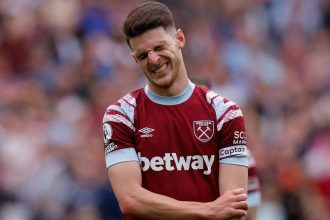The new Apple TV+ docuseries looking back at the 2024 MLS season is a welcome addition, but not as rich or dramatic as initially promised
"Dreamt of or dreamed of – which is it?" Cavan Sullivan poses the question to his older brother, Quinn, during a car ride from their family home to the stadium for what what would be his record-setting debut as the youngest player in MLS history for the Philadelphia Union at Subaru Park. It’s a moment that underscores his youth and a reminder that he was about to make his MLS debut at the age of 14.
If there's one thing production company Box to Box does well in the opening four episodes of "Onside: Major League Soccer," a new docuseries on Apple TV+ looking back on the 2024 MLS season, it's painting the full picture of Cavan Sullivan's journey to becoming arguably the league's most anticipated prospect. It shows the teenager's rise from age of 6, as well as the differences between his stern and fiery father – who literally yells "f***ing right" when he anticipates his son is about to break the MLS mark.
The series treats the time he has left to break the record in a suspenseful countdown every 15 minutes, highlighting all of the factors that go into young athlete make a groundbreaking debut – pressures from the media, and fans, heaped on the coaching staff to get him in on the pitch.
There's a scene at the end of Episode 3 in which Cavan's dad talks to his son, and asks, "What gives, you could've went all the way?" It was a reflection on a missed shot by Sullivan during his debut. In a lot of ways, that statement could reflect the general assessment of this behind-the-scenes show, intended to show fans a side of the league it has never shown before.
While there are definitely compelling storylines here, from Sullivan to Riqui Puig, it also seems to be controlled controversy. Unlike the well-regarded "F1 Drive to Survive" which converted millions of curious F1 watchers into die-hard fans, "Onside" often keeps its viewers at arm's length. The docuseries made its long-awaited debut on Apple TV+ on Friday, the day before MLS's 30th season kicks off. GOAL takes a look at what worked and what didn't for the series through the first four episodes.
Get the MLS Season Pass today!Stream games nowGetty Images SportPro: Coaches tell-all
While the behind-the-scenes access with players in the series is hit and miss, "Onside" does a strong job of bringing out the personalities of various managers in the league. For those who don't get to see the likes of FC Cincinnati's manager Pat Noonan's confident bravado day to day, or have always wondered if Sporting KC's Peter Vermes is as cranky as he comes across in his news confererences, the show does a good job of tapping into that, and how they interact with players.
Fans will see Noonan ignoring his team celebrating his 100th game to carve into them about a poor performance. They'll see Sporting KC's ownership openly discuss wanting to fire Vermes, but diving into all of the reasons why it didn't make sense at the time, as well as the manager's perspective. Lastly, the cool swagger of Wilfried Nancy is all here. That is arguably the strongest part of the show.
AdvertisementGetty Images SportCon: Inconsistent access to players
When "Onside"was announced, both Box-to-Box and MLS promised unparalleled access to the league, its teams, front offices, coaches, and players. Access? Yes. But in comparison toDrive to Survive " or "Hard Knocks"or even some in-house shows created by teams, the MLS series isn't exactly groundbreaking. In the opening four episodes, there are no real forms of conflict.
Curious as to why Lucho Acosta wanted to leave Cincinnati so badly after 2024? That's not here (at least not in the first four episodes). There is a scene in whichcameras try to follow Lionel Messi and Co. into the locker room, only to be shoved away by the Argentine star's well-known bodyguard Yassine Cheuko.
When there are controversies such as Matt Miazga getting suspended for trying to find a referee in the locker room after a controversial call? It is lightly touched on. The incident isn't shown. The saving grace from a player access point of view comes with Tim Parker in Episode 4, showing what it's like to be a non Designated Player getting traded in MLS.
And while the F1 seriesdidn't have full access to the famed superstar Lewis Hamilton until the second season, it gave its audience compelling characters to follow. There's none of that here. More importantly, the show doesn't really give insight (in the opening four episodes) into what it is actually like to play in MLS.
Even NBC Sports's "24 Hours With a MLS Star" did a better job of showcasing that. All of it feels very cookie-cutter, outside of Episode 3, in which the series rightly features Cavan Sullivan as a teen, usage of "Fughazi" and all. Here's hoping if there's a Season 2, the doors will be a bit more open.
Pro: Incredible cinematography
One of the production company's calling cards is its high standard of film capture. There are angles of match footage that are rarely seen in a standard replay show. It feels very high-production – akin to Hard Knocks. For a league in which regular season matches don't always seem crucial, due to the lack of promotion/relegation or a title decider in-season, the strong production gives fixtures a heightened feel.
GettyCons: Where are the owners?
MLS has some of the most unique ownership groups in the world, from Manchester City and the New York Yankees to Will Ferrell and LAFC, there are dozens of potential stories here. Yet, in the first four episodes, ownership involvement is minimal.
Outside of a table-setting scene in the first episode in which David Beckham and Jorge Mas essentially say they want to sign everyone and will try to (Neymar might say otherwise), MLS owners are largely absent aside from two significant instances – SKC's owners considering moving on from Vermes, and St. Louis deciding to move on from Bradley Carnell (all in the fourth episode). Otherwise, it is largely minor cameos – a smile here, a wave there.
In the F1 series, audiences had carte blanche into the various ownership groups and leaders behind each team – and what drives them, literally and figuratively. Fans understood what makes Mercedes largely lead the pact while a smaller team like Williams will struggle.
There wasn't much of that (so far) in the MLS series.






